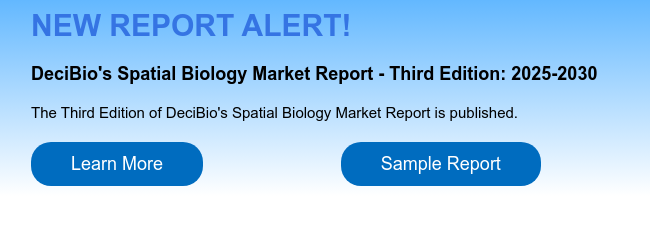Highlights & Summary
April had quite a bit of forward movement in AI for healthcare, especially in drug discovery and diagnostics. Mount Sinai launched a new AI center for small molecule research, and a UCSD-led team used AI to identify a potential early target for Alzheimer’s. Meanwhile, Roche secured the first FDA Breakthrough Device Designation for an AI-powered companion diagnostic, and Plenful raised $50M to scale AI in healthcare operations. Here’s a round-up of the most noteworthy developments.
Happy reading!
Featured DeciBio Insights
1 | Inflection Points of Artificial Intelligence in Drug Development White Paper | DeciBio
AI in Drug Discovery
1 | Mount Sinai Launches AI Small Molecule Drug Discovery Center | New Product
2 | AI-guided hunt points to PHGDH as an upstream drug target in Alzheimer’s disease | New Research
3 | PRISM BioLab and Elix Join Forces to Accelerate AI-Driven Drug Discovery for Protein-Protein Interaction Targets | Partnership
AI in Diagnostics
1 | Roche granted FDA Breakthrough Device Designation for first AI-driven companion diagnostic for non-small cell lung cancer | Regulatory
2 | Leidos Invests $10 Million in AI Disease Detection With University of Pittsburgh | Financing
3 | AI projects seek earlier diagnosis of motor neurone disease (MND) | New Product
AI in Healthcare
1 | Plenful Raises $50M to Scale AI Automation for Healthcare Operations | Financing
2 | Health Catalyst Partners with Microsoft to Accelerate AI-Powered Healthcare Transformation | Partnership
3 | Rush Expands Ambient AI Deployment After Clinicians Report Reduced Burnout and Improved Workflow | Commercial
AI in Drug Discovery
1 | Mount Sinai Launches AI Small Molecule Drug Discovery Center | New Product
The Icahn School of Medicine at Mount Sinai has launched the AI Small Molecule Drug Discovery Center, which will integrate AI with traditional drug discovery methods to identify and design new small-molecule therapeutics targeting cancer, metabolic disorders, and neurodegenerative diseases.
2 | AI-guided hunt points to PHGDH as an upstream drug target in Alzheimer’s disease | New Research
Researchers at the University of California San Diego believe they have found an early pinch point in the biology of Alzheimer’s disease, one that can be blocked without disturbing the brain’s normal chemistry. The scientists credit AI for guiding them there. AI tools (including an in-silico activity map and AI-driven small-molecule library screening) proved crucial in analyzing PHGDH’s protein structure after initial hypotheses failed.
3 | PRISM BioLab and Elix Join Forces to Accelerate AI-Driven Drug Discovery for Protein-Protein Interaction Targets | Partnership
PRISM BioLab, a leading discovery and development biotechnology company designing small molecule inhibitors of protein-protein interaction targets, announced that it has entered into a drug discovery collaboration with Elix. The partnership aims to accelerate research by combining PRISM BioLab's proprietary peptide mimetic technology for controlling protein-protein interactions with Elix's AI drug discovery platform "Elix Discovery."
AI in Diagnostics
1 | Roche granted FDA Breakthrough Device Designation for first AI-driven companion diagnostic for non-small cell lung cancer | Regulatory
The VENTANA TROP2 RxDx Device from Roche is an immunohistochemistry assay combined with a digital pathology algorithm to determine patient treatment. The algorithm incorporates AstraZeneca’s proprietary computational pathology platform, Quantitative Continuous Scoring (QCS), which enables a level of diagnostic precision not possible with traditional manual scoring methods. This is the first Breakthrough Device Designation to be granted for a computational pathology companion diagnostic device.
2 | Leidos Invests $10 Million in AI Disease Detection With University of Pittsburgh | Financing
Leidos is committing $10 million to accelerate the use of artificial intelligence for detecting and managing diseases, in collaboration with the University of Pittsburgh’s Computational Pathology and AI Center of Excellence (CPACE). The initial focus of the five-year collaboration will be developing AI-powered tools for quicker detection of diseases, such as heart disease and cancer, reducing diagnostic turnaround times, and enabling earlier, more effective care management.
3 | AI projects seek earlier diagnosis of motor neurone disease (MND) | New Product
Two projects to provide an earlier diagnosis of motor neurone disease (MND) are set to launch at the Leeds Teaching Hospital (NHS Trust). The first technology leverages magnetic resonance fingerprinting (MRF), while the second plans to use AI on videos of patients' limbs and tongues to identify small muscle twitches that are a key sign of the condition.
AI in Healthcare
1 | Plenful Raises $50M to Scale AI Automation for Healthcare Operations | Financing
Plenful, an AI automation platform for healthcare operations, raised $50 million in Series B funding co-led by Mitchell Rales and Arena Holdings, bringing its total funding to $76 million. The platform automates administrative workflows like prior authorization and compliance audits, aiming to reduce healthcare’s $1 trillion annual admin burden. Plenful is used by over 60 healthcare organizations and plans to expand across pharmacy, health systems, and payor markets. The funding will support product development and team growth to scale its AI-driven solutions.
2 | Health Catalyst Partners with Microsoft to Accelerate AI-Powered Healthcare Transformation | Partnership
Health Catalyst announced a strategic partnership with Microsoft to accelerate AI adoption in healthcare, leveraging Microsoft Azure and Azure AI Foundry. The collaboration aims to help care providers enhance clinical, operational, and financial performance through AI-powered solutions. Health Catalyst's Healthcare.AI and Ignite platforms are now available on the Azure Marketplace, expanding access to advanced analytics and improvement services. The partnership combines Health Catalyst’s healthcare expertise with Microsoft’s technology to drive scalable, data-informed outcomes.
3 | Rush Expands Ambient AI Deployment After Clinicians Report Reduced Burnout and Improved Workflow | Commercial
Rush University Medical Center has begun rolling out ambient AI technology from Suki across its system after a successful pilot showed that 74% of clinicians experienced reduced burnout and 95% wanted to continue using it. The AI tool, integrated with Epic, generates draft clinical notes using ambient listening and generative AI, supporting documentation in 25 non-English languages. It aims to alleviate administrative burden, improve documentation quality, and enhance clinician well-being, especially in a diverse patient population.

.png)










.png)


